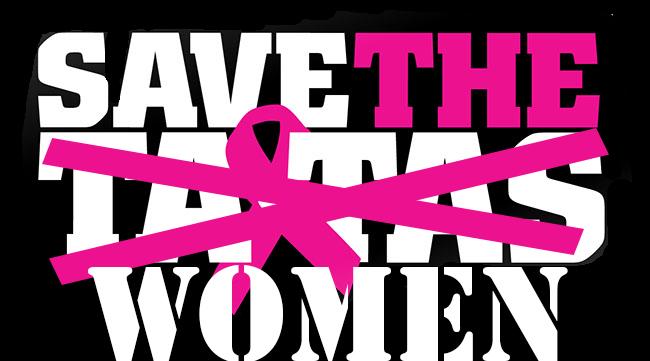In light of October being National Breast Cancer Awareness month, it’s high time we address a slogan which has no place in the discussion of saving women’s lives—“Save the tatas.”
Not only is this slogan a juvenile phrase that reduces women to their chests, it completely misses the point. Breast cancer awareness isn’t about saving women’s breasts. It’s about saving women’s lives.
The phrase originated from a for-profit T-shirt company headed by clothing designer Julia Fikse in 2004. Fikse has never had breast cancer, but was inspired to address the issue because she knew people who faced the disease.
Unfortunately, Fikse made the ill-advised decision to use sex to sell awareness.
Just five percent of the proceeds from Fikse’s shirts, which also feature exploitative slogans like “I love my big ta-tas,” go to breast cancer research.
According to an interview published by KOMO-TV News, when planning a possible slogan, Fikse bounced ideas off her husband. He laughed at the word “tatas”—likely because it’s juvenile and tasteless—and Fikse ran with it.
According to Breastcancer.org, “about 40,290 women in the U.S. are expected to die in 2015 from breast cancer,” while the National Cancer Institute reports that “approximately 12.3 percent of women will be diagnosed with breast cancer at some point during their lifetime.”
A disease like breast cancer, which affects so many and has taken so many lives, should never be reduced to a light-hearted catchphrase.
Proponents of the slogan seem to believe that making light of the issue helps to remove the shame of openly discussing health issues that affect your intimate body parts while also bringing levity to a grim subject.
However, we don’t need to make light of an issue or sexualize it to remove the shame. There should never, ever been any shame in discussing your personal health, and slogans like this may in fact re-sexualize the issue by appealing primarily to men’s views of women’s anatomy.
Furthermore, breast cancer doesn’t just affect women. While breast cancer is 100 times more likely in women, 2,350 cases of breast cancer in men will be diagnosed and 440 will die from the disease in 2015 alone, according to the American Cancer Society.
Gendering a disease that affects both men and women is a move that will undoubtedly create more stigma for male breast cancer victims and survivors.
It’s insulting to men to presume that getting men to support breast cancer awareness and prevention requires spinning the issue into being about the breasts, not the women who own them.
Many women with breast cancer lose both of their “tatas” to bilateral mastectomies—the surgical removal of both breasts—in an effort to survive.
By focusing the issue on their breasts, “save the tatas” proponents show a disrespect for women that borders on misogyny.
Women who lose their breasts to this disease are no less woman than they were before, and frankly, these slogans are encouraging misogynistic views of women as nothing more than body parts.
How do the slogan’s proponents think focusing the issue on men’s love of breasts feels to women who have lost both of these apparently prized assets?
Women are not their anatomy. Forcing women who are battling or recovering from breast cancer to think about how sexually desirable they will be while fighting to survive is wholly inappropriate and sexist.
Screw the tatas. Save the women.








